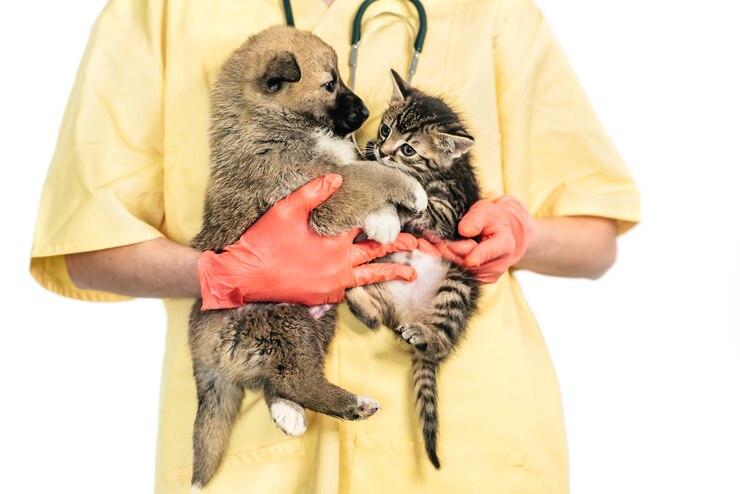As much as humans need to have a balanced diet, so do the animals. Both domesticated and wild animals require nutrients in right proportion for them to feed, grow and stay healthy. This is because they require balanced nutrition for their health, their brains, and even for how long they are going to live. As in human beings, bad feeding can cause severe health challenges; the two main common challenges being immune compromise, and development of chronic diseases due to nutrient imbalances and deficiencies.
Living in the modern world, people have to deal with many different illnesses themselves, or their pets, VeryWellHealth will guide them through the principles of nutrition for animal care to show what is necessary to maintain balanced meals to support animals’ health at different stages of their lives.
1. The Key Facts About Balanced Diet in Animals
As used here, nutrient density for animals means offering the animal care all nutrient classes in proper amounts needed for the species and age. Animal care require six primary nutrients: This required water, carbohydrates, fats, proteins, vitamins and mineral products. These nutrients each have specific roles; they participate in the body’s functions as diverse as metabolism and healing of tissue.
Water
The base level support for muscles and other part of the body like digestion and regulation of body heat and nutrients.
Carbohydrates
Act as fuel for the processes of movement and the cells’ functioning.
Fats
Offer energy, aid in the digestion of nutrients, and belong to the cell’s construction.
Proteins
CRITICAL for cell formation and maintenance of tissues, muscles and immunity defense.
Vitamins
Promote metabolism, skin conditions and immune responses.
Minerals
Vital in maintenance of bone, nerve tissue and blood.
2. Nutrient for each of the animal-type.
Every sort of animal species has special requisite of meal depending on habitats, physiology and evolutionary history. Here is a breakdown of common animal groups and their nutritional needs:
Carnivores
Dominant types of nutrients include protein and fat, and typical consumers are cats and certain types of reptiles. If these are missing, they profoundly increase one’s risks to heart diseases, eye problems, and developmental complications.
Herbivores
Rabbits, horses, and cows for instance mostly feed on plant derived products. The teeth and intestines of their digestive systems are well developed for humors that break up fiberous plant materials. They require proper nutrition to have a healthy and efficient digestive system and immune system, vitamins, minerals and fiber included. For example, while feeding rabbits, you’d want to feed them foods that would encourage good digestion and help prevent obesity in them, and these include high fiber foods.
Omnivores
Some animals like dogs and pigs are omnivores because they eat both animals, and plant products. For these animals, there is the combination of protein, fat and carbohydrate for balancing the nutrients. For example, the dog’s diet must contain protein, fat and carbohydrates; however a dog also needs omega-3 fatty acids for the skin and the joints.
3.Understanding the Importance of Balanced Diet in Curtailing Diseases
The disease prevention process relevant for animals depends on the proper intake of nutrients and food balance. Nutritional deficiencies or imbalances can lead to a range of health issues, such as:
Obesity
This leads to obesity which results in inflammation within the joint, diabetic complications and cardiovascular diseases.
Immune Dysfunction
Any deficiency of vitamins and minerals compromises the defense mechanism of the animals and will lead to easy invasion by diseases and infections.
Dental Issues
Again, due to poor diets, or lack of right chew substance to a herbivore or carnivore dental complications may be expected.
Developmental Delays
Growing young animals require special nutrients for their growth. Lack of calcium or vitamin D, for instance, results in the development of bones in the wrong shape, and other problems.
4. Nutrient-Requirement for Animal Care
Diet
If the animal is a pet it also has fluid and nutrient needs that change with the age of the animal. Here’s how nutritional requirements differ at different life stages:
Growth population or Development population
They are most nutrient sensitive and very sensitive to protein, calcium phosphorus and vitamin and requirement for growth at this stage is very high. That is why, for instance puppies and kitten require more protein compared to other animal categories, since muscle and tissue formation is a paramount requirement among the young animals.
Maintenance (Adult Animals)
Adult animals require an energy density that helps them have a regular energy requirement without the need to put on certain amount of fat. The foods that they should consume should be those that help maintain good health, muscle and organ health.
Senior Animals
Dogs and cats get less active as they grow older, developing less of an appetite but having increased need for nutrients that help their joints and organs.
5. The Requirement of Working and Breeding Animals for Special Nutrients
Other tissues may include working dogs, racehorses or breeding animals with different nutrient profile required to support their more vigorous activities. It must also be recalled that specialized canine breeds like working dog require protein and fats at higher levels than sedentary animals since they require regular energy throughout their work time. Reproductive animals, on the other hand, needs diets with important fats, proteins, and vitamins to support their reproduction healthiness and control the health of their off springs.
6. Supplemental and Dietary Management of Specific Animal Health Problems
Certain animals have health conditions requiring tailored diets:
Diabetic Animals
Diabetic dogs and cats such as dogs and cats should be fed low sugar diets and high fiber diet.
Kidney Disease
That is why patients with kidney disease eat low-protein and control phosphate diets to decrease the load on kidneys.
Allergies
Pets that are allergic to certain foods will need preservative-free meals in order not to develop skin rashes or upset stomachs.
7. Supplements as a Factor in Animal Nutrition
Many supplements are very important for the animal care should go a long way in supplementing animal nutrition especially where certain nutrients cannot be provided in adequate quantities through feeds. Common supplements for animal health include:
Omega-3 Fatty Acids
Good for skin, minimize inflammation and encourages healthy coat.
Probiotics
Supports efficient digestion and helps to reach the level of balanced gut microbiota.
Joint Supplements
Aid in the control of arthritis and muscle soreness and to aid in the mobility of geriatric animals.
Supplements should not be taken without consulting the veterinarian for dosage issues because they can be toxic.
8. Unsaturated Diets and Feed Induced Obesity and Their Risks
Imbalanced diets and provision of outrageous quantities of foods can cause serious health risks of animals. Malnutrition for instance; overnutrition is a growing issue among pets and owned livestock due to excessive calorie consumption and or low nutrient density diets. Common issues linked to unbalanced diets include:
Cardiovascular Problems
Normally, obesity is a cause of cardiovascular problems because it tends to exert pressure on the heart.
Joint Disorders: Overweight also affects the bones as they press on them causing arthritis and complications in mobility.
Diabetes
Obesity and or over feeding and feeding on foods rich in sugar are some of the causes of diabetes.
9.Balanced Diet for Animals
For pet owners, ensuring a balanced diet involves:
Reading Labels
Select pet foods with labels that have AAFCO, this is the Association of American Feed Control Officials’ mark, meaning the foods provide proper nutrition.
Portion Control
Do not over feed your body by taking more than the recommended portion size.
Regular Check-Ups
Health check up by a vet followed by feed recommendations is vital when it comes to animals.
Homemade Diets
If choosing home-made diets, it is better to encourage the help of a veterinarian or special specialist in the field of pet nutrition.
10. Effectiveness of Balanced Feeding on Health and Longevity of Animals
Therefore, animals with proper diet are healthier, happier, and live longer than the others who don’t have proper diet. A proper diet can:
Enhance Vitality
Healthy diet helps sustain animal energy hence play, explore and perform various activities.
Support Mental Health
Some nutrients for example omega three fatty acids have been known to reduce anxiety and stress in animals.
Extend Lifespan
This means a healthy diet can result in increase in an animal’s advanced age that can be achieved by avoiding obesity and chronic diseases.
FAQ’s
1.What is the role of balanced diets on animal health?
Proteins, vitamins and minerals; adequate as well as essential nutrients are obtained from balanced diets which include calories to keep the animals in good for health, tone up their immune system and grow healthier to live longer.
2. What nutrients are mandatory for animals?
Students shall be informed that animals’ water, proteins, fats, carbohydrates, vitamins, and minerals are essential for normal body functions, growth, and maintenance of body health.
3. Does a balanced diet help to avoid problems in the animals’ body?
Of course, the balanced diet is helpful to avoid obesity, diabetes, immunologic dysfunctions, and numerous other pathologic states because of the appropriate nutritive value.
4. How can I be sure of the fact that a pet is having balanced diet that he deserves to have?
It is always advisable to seek the services of a vet and using pet foods that are AAFCO approved can go along way in feeding pets a balanced diet.
5. Do my pet require supplements in their diet or food?
While some supplements could help; there are ones designed to promote joint, skin health among others it is advisable to consult a vet before giving your pet these foods.
Conclusion
There is no doubt that every animal must be feed appropriately because their nutrition determines their health, energy and their lifespan. The active needs of working animal care, the diet necessary for pets are all covered by a balanced diet that makes for a long, healthy and good life. When readers appreciate the needs of their pets and livestock in terms of feeding, they will be in a better position to give their animals the best care. Even the animals take good care have a good body and a sound mind so the nutritional need for an animal is on of the most important factors to consider. You will get all over guidance and help about your pets on VeryWellHealth.



